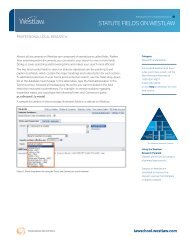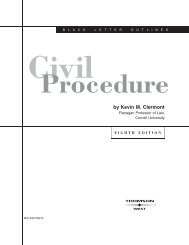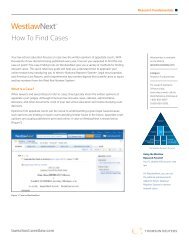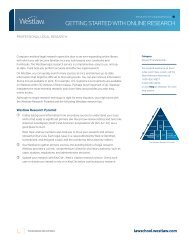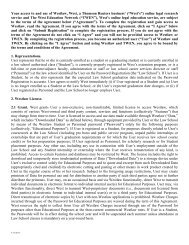Winning Research Skills - Westlaw
Winning Research Skills - Westlaw
Winning Research Skills - Westlaw
You also want an ePaper? Increase the reach of your titles
YUMPU automatically turns print PDFs into web optimized ePapers that Google loves.
Chapter 2<br />
Case Citation <strong>Research</strong><br />
As you evaluate the usefulness of a case for your purposes, you will need to understand the<br />
history of that case and how it has been treated by subsequent cases. Citator services help you<br />
with these essential tasks. You can perform citation research using print resources (e.g.,<br />
Shepard’s Citations) or online services. KeyCite, the online citation research service available<br />
exclusively on <strong>Westlaw</strong>, is discussed in detail in Chapter 12.<br />
Three Reasons to Use a Citator Service<br />
Reason #1: Because Good Law Can Go Bad<br />
Nothing would be more damaging to your client’s interests—or your moot court brief—than<br />
resting your arguments on bad law. The first reason to use a citator service is to avoid such a<br />
mistake.<br />
Though the law is conservative, it does change—sometimes more quickly than you might expect.<br />
In the history of American jurisprudence, thousands of cases have been reversed or overruled by<br />
subsequent adjudications. These “bad cases” remain in the law books and databases, but you<br />
may not want to rely on them to support a legal argument.<br />
For example, you can find the 1942 Supreme Court case of Betts v. Brady in the reporters for<br />
U.S. Supreme Court cases. Betts holds that the Sixth Amendment does not apply to the states<br />
and that there is no absolute right to counsel in a state criminal trial. Nothing in those reporters<br />
says “Please note that this case has been overruled and is no longer good law.” If you stopped<br />
your research after you read the opinion, you would believe that the Sixth Amendment did not<br />
require a state to provide an attorney for an indigent defendant charged with a crime. However,<br />
if you take the next step in the research process by checking the current status of Betts v. Brady,<br />
you will learn that the case was overruled in 1963 by Gideon v. Wainwright.<br />
Reason #2: Because an Opinion Is Subject to Interpretation<br />
The second reason to use a citator service is to determine how a case has been treated by other<br />
cases. Aside from the question of being good law or bad law for a particular purpose, the<br />
holding of a case may be strengthened or weakened by the interpretation subsequently given it<br />
by the same court or other courts. It may be, for example, that another court that subsequently<br />
confronted a situation similar to the one in your case chose to construe the holding of your case<br />
narrowly. Although your case remains good law, such subsequent interpretations may make it<br />
less persuasive. The precedential value of a case greatly depends on the treatment it receives in<br />
later opinions that cite it.<br />
Reason #3: Because You Need More Cases<br />
A third reason to use a citator service is because it will help you expand your research. Because<br />
cases tend to cite the seminal or leading cases in a particular area of law, if you find a leading<br />
case and check it in a citator, you are likely to discover other cases.<br />
30 <strong>Winning</strong> <strong>Research</strong> <strong>Skills</strong>





